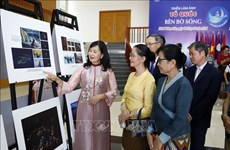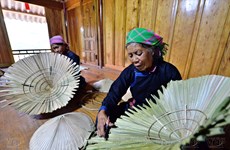Campaign to preserve folk festivals
Vietnam should carry out a long-term campaign to conserve and develop
folk festivals because people from industrialised countries are
fascinated by culture of agricultural societies, experts say.
Vietnam should carry out a long-term campaign to conserve and develop
folk festivals because people from industrialised countries are
fascinated by culture of agricultural societies, experts say.
The Tin tuc (News) newspaper cited the experts as saying that the campaign should heighten public awareness of the need to preserving the nation's folk culture and at the same time, intensify to research into rituals and festivals with a view to restoring them authentically.
Concerned agencies should create favourable conditions for the festivals to thrive by supporting ethnic minorities develop economically and improve their living standards.
They stressed the need for macro-level policies to manage and organise these festivals regularly, preserve the national character, and promote the traditional skills and talents of residents, in making various handicraft items for instance.
Folk festivals are "live museums" of cultural and historical value and they play a big part in attracting visitors to the country, the paper said.
In 2000 – when the national programme of action on tourism was launched – the sector chose to develop products associated with 15 major festivals typical to various regions and ethnic minorities.
These included the Long Tong Festival celebrated by the Tay peoplethe earliest known ethnic group in Vietnam , the Kate Festival of the Cham people and the Ooc Om Bok Festival of the Khmer people.
While the programme aimed to respect and conserve the nation's tradition while meeting the demand of tourists, there have been several inadequacies in implementation, said Hoang Thi Diep, deputy director general of the Vietnam National Administration of Tourism.
She said the organising of folk festivals of ethnic minorities in several instances left a lot to be desired because they were "supplemented with modern and miscellaneous cultural aspects" that robbed the events of their authenticity, disappointing visitors.
Some festivals were overly commercialised and some even took advantage of superstitions, Diep said.
Le Thi Minh Ly, deputy director of the Cultural Heritage Department under the Ministry of Culture and Information, said it was necessary to spread accurate information via mass media about the festivals so visitors can also respect and not destroy the festive environment.
"Authorities in localities should also make residents aware of the risk of commercialising their traditional festivals, as also not misuse them for gambling and other negative activities," Ly said.
It is estimated that 7,966 festivals are held every year nationwide, 88 per cent of which are folk festivals.
Festivals of ethnic minorities are usually linked to their daily lives and a valuable social and cultural resource that need to be preserved well, experts said./.
The Tin tuc (News) newspaper cited the experts as saying that the campaign should heighten public awareness of the need to preserving the nation's folk culture and at the same time, intensify to research into rituals and festivals with a view to restoring them authentically.
Concerned agencies should create favourable conditions for the festivals to thrive by supporting ethnic minorities develop economically and improve their living standards.
They stressed the need for macro-level policies to manage and organise these festivals regularly, preserve the national character, and promote the traditional skills and talents of residents, in making various handicraft items for instance.
Folk festivals are "live museums" of cultural and historical value and they play a big part in attracting visitors to the country, the paper said.
In 2000 – when the national programme of action on tourism was launched – the sector chose to develop products associated with 15 major festivals typical to various regions and ethnic minorities.
These included the Long Tong Festival celebrated by the Tay peoplethe earliest known ethnic group in Vietnam , the Kate Festival of the Cham people and the Ooc Om Bok Festival of the Khmer people.
While the programme aimed to respect and conserve the nation's tradition while meeting the demand of tourists, there have been several inadequacies in implementation, said Hoang Thi Diep, deputy director general of the Vietnam National Administration of Tourism.
She said the organising of folk festivals of ethnic minorities in several instances left a lot to be desired because they were "supplemented with modern and miscellaneous cultural aspects" that robbed the events of their authenticity, disappointing visitors.
Some festivals were overly commercialised and some even took advantage of superstitions, Diep said.
Le Thi Minh Ly, deputy director of the Cultural Heritage Department under the Ministry of Culture and Information, said it was necessary to spread accurate information via mass media about the festivals so visitors can also respect and not destroy the festive environment.
"Authorities in localities should also make residents aware of the risk of commercialising their traditional festivals, as also not misuse them for gambling and other negative activities," Ly said.
It is estimated that 7,966 festivals are held every year nationwide, 88 per cent of which are folk festivals.
Festivals of ethnic minorities are usually linked to their daily lives and a valuable social and cultural resource that need to be preserved well, experts said./.













